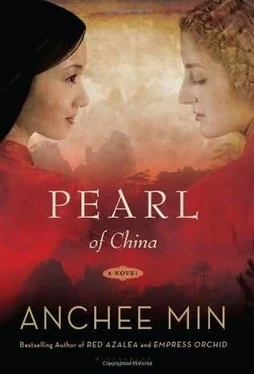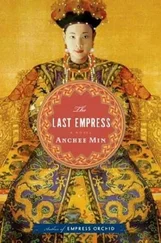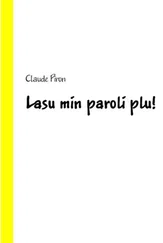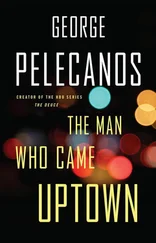“You haven’t answered my questions.”
“I am tired.”
We sat facing each other for a long time. Our dinner was on the table, but we had no appetite.
“When Mao panics, he gets carried away,” Dick said, taking a deep breath. “He needed to purge the anti-Communist bug.”
“Did he do the right thing ordering the murders of those young people you recruited?”
“At the time, yes. But now, no. The tragedy was the party’s loss. It benefited no one but our enemies.”
“Dick Lin, I have been watching you running around trading on your reputation to get people to return to China. What if Mao changes his mind? What if those people say and do things that end up displeasing and offending Mao? Are you going to be the executioner?”
“It won’t happen.”
“I thought by now that you knew Mao.”
“I do.”
“Then you are evil to follow him.”
“I am riding on the back of a tiger. I will die if I try to get off.”
“What a selfish statement!”
Dick turned away and went to sit in a chair. He cupped his face with his hands. “You have never approved of what I do anyway.”
“You refuse to acknowledge the truth.”
“What truth?”
“There is no Communism but what Mao wants!”
“Comrade Willow.” Dick stood up. “I have never insulted your God, so please stop insulting mine.”
I was arrested at home while washing the dishes. I never expected a postal officer to turn me in. I was denounced and accused of being an American spy. Without a trial, I was thrown in prison. I had seen this happen to others, but I was shocked when it happened to me.
Dick pulled strings. But no one dared to help. My crime was my friendship with Pearl Buck. Dick said that it wasn’t Pearl Buck’s literary success that made her China’s enemy, but her refusal to be the Maos’ friend.
Since taking over China, the Maos had wished that Pearl would give her support to the regime. But Pearl kept her distance. Agents from China repeatedly contacted her hoping that she could do what the American journalists Edgar Snow and Anna Louise Strong had done for China. Although Pearl was friendly with both journalists, she held her own political views. In the late 1950s, when millions of Chinese starved to death during the Great Leap Forward, Pearl criticized Mao. She pointed out a crucial fact that others had ignored: “Mao allowed his people to die of starvation and disease while he helped the North Koreans fight a war against the Americans.”
“Is Pearl Buck a friend or an enemy?” Dick told me Mao had once asked him.
Dick answered truthfully that Pearl Buck loved the Chinese people, but she didn’t believe in Communism.
Mao instructed Dick to work on Pearl Buck. Mao wanted Dick to repeat the success he had achieved when he had talked General Chu into switching sides in 1949. Mao made Pearl Dick’s next challenge. Mao’s order to Dick was clear: “I’d love to gain a Nobel Prize winner as a comrade.”
Behind my back, Dick wrote to Pearl. She didn’t respond, and she didn’t mention Dick’s efforts in any of the letters she wrote to me.
Frustrated, Dick asked Mao why he had to have Pearl Buck.
“There is no comparison between Pearl Buck and Edgar Snow,” Mao replied. “Pearl Buck is read in every country on the world map. Her books have been translated into over a hundred languages! If Edgar Snow is a tank, Pearl Buck is a nuclear bomb.”
Dick failed in his mission because Pearl was too knowledgeable about China to be fooled. Pearl judged Mao by his actions, not by his fancy slogans. “Serve the people with heart and soul” meant nothing to her. Like her father, Absalom, Pearl refused to be bought. The novels she wrote during the 1960s depicted the tragic lives being led under Mao, although she wrote them from across the sea and was only guessing. It seemed that her senses were growing sharper as she aged.
Dick never shared with Mao his opinion that Pearl Buck was the only Westerner with the ability to write about China’s reality with both humanity and accuracy. Dick never mentioned that he admired Pearl, but I knew he did.
Dick didn’t have the courage to challenge Madame Mao when she declared Pearl’s newest novels attacks on Communism. Madame Mao believed that Pearl was part of the American conspiracy against China. Dick was ordered to encourage China’s propagandists to mount a counterattack. Pearl Buck was labeled a “cultural imperialist.”
Madame Mao set Pearl Buck up as a negative example. She was getting ready to help her husband launch the Great Proletarian Cultural Revolution. The goal was to secure Mao’s power in China and beyond.
Making his personal passion for destroying his enemies the nation’s obsession was Mao’s greatest talent. Dick said that I was better off in prison. When Rouge visited me in May of 1965, she told me that the outside world had turned upside down. Teenage mobs calling themselves Mao’s Red Guard chanted, “Whatever our enemy embraces, we reject, and whatever our enemy rejects, we embrace.” They sang Mao’s slogans as they attacked people they suspected were anti-Mao.
Rouge was worried about my declining health and the fact that I was not allowed to see a doctor. She prayed with me for the first time in many years. She told me she wanted to learn more about God, but I feared that she had been brainwashed too thoroughly and one day might turn on me. I felt the best way to influence her was through my own example.
Early one morning, I was dragged from my cell. I was told that the Red Guard had taken over the prisons. I was to be beaten to death unless I denounced Pearl Buck.
Thin, rancid rice porridge was all I was fed and there was never enough. Hunger gnawed at my insides. There was no electricity or water. My cell was a dark concrete box without windows. I lost all sense of time. I knew many people had been driven mad that way.
To preserve my sanity, I began singing Christian songs to myself. When I was ordered to stop singing by the prison guards, I changed my methods. I practiced finger calligraphy, recalling sentences from the Bible. Since there was no water available, I wet my index finger in the urine bucket and wrote the words on the concrete surface of the floor as if it were rice paper. I moved from left to right. By the time I reached the lower corner, the top corner was dry and ready for me to write on again.
Time passed without measurement. There was no mirror, so I didn’t know how I looked. One day I noticed strands of my own hair on the floor and realized that my hair had turned white.
Eventually, a prison guard came and led me to another room, where there was a table, chair, and sink. I was given a comb and a toothbrush and was told to make myself presentable.
“You have an assignment,” the guard told me. I was to meet a high-ranking party official.
After I had cleaned up, two men in soldiers’ uniforms escorted me to a car. One of them tied a cloth blindfold over my eyes.
It was a long ride over bumpy roads.
When the blindfold was removed from my eyes, I discovered that we had arrived in front of a military complex. We passed through a narrow entrance. I smelled food cooking. The soldiers led me to a large room where there was a stained carpet, red sofas, and deep-green curtains. There was a basket of bananas on the table.
“Help yourself,” a female attendant said in perfect Mandarin.
I would not have touched anything if I hadn’t been dying of hunger. Like a monkey, I grabbed a banana. Quickly peeling off the skin, I stuffed the banana into my mouth. I was so absorbed in chewing that I didn’t pay attention to anything else. When I reached out for another banana, I noticed a person sitting on the sofa. At first I thought it was a man because she was dressed in a man’s army uniform. She was wearing the green cap with a red star in the front.
Читать дальше












